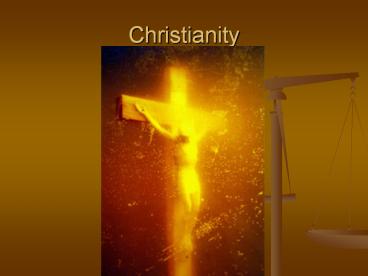Christianity - PowerPoint PPT Presentation
1 / 43
Title:
Christianity
Description:
Christianity. Amos Elijah (= 'El is Yah' or 'God is Jehovah) Jeremiah. Anti ... Gnosticism The first principle was neither comprehensible nor incomprehensible ... – PowerPoint PPT presentation
Number of Views:89
Avg rating:3.0/5.0
Title: Christianity
1
Christianity
2
Anti-temple prophets
Amos Elijah ( El is Yah or God is
Jehovah) Jeremiah
3
Some Pro-Temple Prophets.
Haggai Build me a house Ezekiel inner
conscience as judge of humans
4
Isaiah the Prophet of JesusHeaven is my
throne and Earth, my footstool
5
Israel the Greek PeriodAlexanders Empire ca.
323 BCE
6
Rome at its heightca. 200 CE
7
Pharisee, Sadducee, Zealot, Essenesdiaspora
dispersal
8
The Second Messiah Bar Cochba (Revolt in Judea
ca. 132-135 CE)
9
Jesus the Prophet, Jesus the God
10
(No Transcript)
11
Aphrodite and Eros from Tenagra (ca. 4th century
CE)and Pompeii (middle)
...Mary, mother of Jesus, to the right
12
Heracles, Hercules a model for Christ?Three
views of Christ Judaizer or the old-time
Jewish wing of the now predominantly Gentile
faith Gnostic the more Greek and Hindu
style ChristianityOrthodox / Catholic synthesis
13
James the Just,(d. 62 CE) Brother of Jesus,Head
of the Jerusalem church
14
GnosticismGospel of Thomas the Twin,Doubting
Thomas, doubting Christ was resurrected in the
fleshThomas meaning Twin brings the
messianic Judaism we today call Christianity to
India. Reincarnation among other Hindu-like
beliefs are part of this wing of only historical
survivor of the anti-Gnostic persecution by the
orthodox
15
The Gnostics were distinguished as the most
polite, the most learned, and the most wealthy of
the Christian name. Gibbon (Decline Fall)
16
Valentinus theGnostic (ca. 100 160 CE)
17
Constantine I The Great2721 337)
18
Four PatriarchatesJerusalem, Corinth,
Alexandria...Rome
19
Hagia Sophia Holy Wisdomin Constantinople
20
The Latin Patriarchatea.k.a. Roman Catholicism
21
Yikes! Germans!Along with Slavs,
Barbariansto Greek and Roman alike
22
Dark AgesThank God for the Pope!
23
Islam Success of the final anti-temple Prophet
against the evil priests of later Christendom
Age of the Caliphs Expansion under the
Prophet Mohammad, 622-632 Expansion during
the Patriarchal Caliphate, 632-661 Expansion
during the Umayyad Caliphate, 661-750
24
Abbasids Dynasty 750 1258The Abbasid
Caliphate (Arabic ????????????, al-Abbasiyun)
was the third of the Islamic Caliphates of
the Arab Empire.
25
The Fatimid Caliphate or al-Fatimiyyun (Arabic ???
??????) Arab Shi'a dynasty that ruled over
varying areas of the Maghreb, Egypt, and
the Levant from 5 January 909 to 1171. It was the
fourth and final Arab caliphate. The caliphate
was ruled by the Fatimids, who established the
Egyptian city of Cairo as their capital
26
(No Transcript)
27
The Empire Strikes Back! Bringing the Cross
to the Infidel
- The Crusades were a series of religion-driven
military campaigns waged by much of
Christian Europe against external and internal
opponents. Crusades were fought mainly
against Muslims, though campaigns were also
directed against pagan Slavs,Jews, Russian and
Greek Orthodox Christians, Mongols, Cathars, Hussi
tes,Waldensians, Old Prussians and political
enemies of the popes.1 Crusaders took vows and
were granted an indulgence for past sins.1
28
- For the first decade, the Crusaders pursued a
policy of terror against Muslims and Jews that
included mass executions, the throwing of severed
heads over besieged cities walls, exhibition and
mutilation of naked cadavers, and even
cannibalism, as was recorded after the Siege of
Maarat.
29
- Once inside the city, as was standard military
practice at the time,15 the Franks then
massacred the civilians, destroyed mosques and
pillaged the city.16 The crusaders finally
marched to the walls of Jerusalem with only a
fraction of their original forces.
30
Mongol Empire at peak (ca. 1294)
31
Turkish (Ottoman) Empireca. 1683
32
Martin Luther (November 10, 1483 February 18,
1546) was a German monk,1 theologian,
university professor, Father of Protestantism,2
345 and church reformer whose ideas
influenced the Protestant Reformation and changed
the course of Western civilization.6
Justification by faith
33
The classical period of witchhunts in Europe
falls into the Early Modern period or about 1480
to 1700, spanning the upheavals of
the Reformation and the Thirty Years' War,
resulting in tens of thousands of executions.
34
John Calvin (or Jean Calvin in French) (10 July
1509 27 May 1564) was a French Protestant theolo
gianduring the Protestant Reformation and was a
central developer of the system of Christian
theology calledCalvinism or Reformed theology.
In Geneva, his ministry both attracted other
Protestant refugees and over time made that city
a major force in the spread of Reformed theology.
He is famous for his teachings and writings, in
particular for his Institutes of the Christian
Religion.
35
Persian Empire(ca. 500 BCE)
36
Buddhism comes West
- Greeks and Romans
- Platonic and Gnostic reincarnation
- Gnosticism The first principle was neither
comprehensible nor incomprehensible - St. Clement of Alexandria
- Desert Fathers and the sramana movement
- Josaphat in medieval period
- Marco Polo and the Khans
- Sagamani Borcan (following Mongolian
pronunciation) for certainty if he had been
baptized a Christian he would have been a great
saint before God.
37
Empire of Alexander the Great(ca. 326 BCE)
38
Roman Empire (ca. 117 CE)
39
Gnostic GospelsThomas
- These are the secret words which the living Jesus
spoke, and Didymus Judas Thomas wrote them down.
But the Kingdom is within you, and it is outside
of you. When you know yourselves, then shall you
be known, and you shall know that you are the
sons of the living Father. But if ye do not know
yourselves, then you are in poverty, and you are
poverty. - In the days when you were eating that which is
dead, you were making it alive. When you come in
the light, what will you do? On the day when you
were one, you became two. But when you have
become two, what will you do?
40
Kerala Home of Thomasist Christians
41
Hun Empire(ca. 451 post-Roman)
42
Persian (Sassanian) Empire(ca. 6th century CE)
43
Arab Empire(ca. 750 CE)































